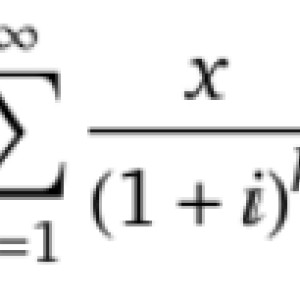Sum of infinite series
If you noticed, without the summation notation, it is the present value money formula with finite time period.
PV - present value
FV - future value
i - interest rate
n - number of years
PV = FV/(1+i)^n
The present value money formula with indefinite time period is
PV = D / i
D - dividend (which is FV every year)
I'm curious if the infinite summation of FV/(1+i)^n (see the picture attached) is D / i.
Step by step process and explanation appreciated.
Answer
Answers can only be viewed under the following conditions:
- The questioner was satisfied with and accepted the answer, or
- The answer was evaluated as being 100% correct by the judge.
4.8K
-
Please leave a comment if you need any clarifications.
The answer is accepted.
Join Matchmaticians Affiliate Marketing
Program to earn up to a 50% commission on every question that your affiliated users ask or answer.
- answered
- 1571 views
- $4.00
Related Questions
- using maclaurin series for tan(x) and equation for length of cable to prove that x=
- Convergence of $\sum\limits_{n=1}^{\infty}(-1)^n\frac{n+2}{n^2+n+1}$
- Arithmetic Sequences Help
- Show that ${(x,\sin(1/x)) : x∈(0,1]} ∪ {(0,y) : y ∈ [-1,1]}$ is closed in $\mathbb{R^2}$ using sequences
- Infinite Geometric Series
- Determine the Closed Form of a Recurrance Relation
- Taylor polynomial
- Prove that $1+\frac{1}{\sqrt{2}}+\dots+\frac{1}{\sqrt{n}} \leq 2 \sqrt{n}-1$



Your question is vague. Do you want to compute the sum in the attached picture? What is x?